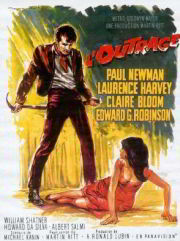 This February’s Akira Kurosawa film club title is The Outrage (1964), the Martin Ritt directed remake of Kurosawa’s Rashomon, which we watched last month.
This February’s Akira Kurosawa film club title is The Outrage (1964), the Martin Ritt directed remake of Kurosawa’s Rashomon, which we watched last month.
Calling The Outrage a remake of Rashomon in fact simplifies the things somewhat. Kurosawa’s 1950 film was adapted into a Broadway play in 1959 by Fay Kanin and Michael Kanin. Simply titled Rashomon, it claimed to be using Akutagawa’s original stories as its source, but according to Martinez (47) the work is really adapted from Kurosawa. On a personal note, I have not read the play, but have ordered it: it is available fairly cheap from Amazon.com, Amazon.co.uk and The Book Depository, among other places.
The play was turned into two TV films, first in the US in 1960 with Sidney Lumet directing, and then again in the UK in 1961 with Rudolph Cartier helming the production. Michael Kanin was then hired to work on the screenplay for a feature film, which would become The Outrage, and which recognizes Kurosawa’s version, although fails to credit Kurosawa’s co-author Shinobu Hashimoto.
The Outrage transports the events of Rashomon to the US-Mexican border and into the old west setting. Apart from this change of milieu, the screenplay is fairly faithful to Kurosawa’s original film, and doesn’t add much new. Unfortunately, the film does suffer from somewhat lower production values throughout, and is as a result quite uneven, especially when it comes to acting. Aesthetically, it could be said that the film resembles more European cinema than Hollywood of its time.
The Outrage is available in region 1 DVD from Amazon.com, and in region 2 from Amazon.co.uk, among other places. Good background reading for the film is the previously mentioned book by Martinez, which concentrates on remakes of Kurosawa’s films, and therefore also discusses The Outrage.
Next month, we will continue with the Kurosawa chronology, and will be watching The Idiot, Kurosawa’s adaptation of Dostoevsky’s novel of the same name. For its availability, see Kurosawa DVDs.






Just a word of warning: The Book Depository link that I gave earlier for the play Rashomon by Fay and Michael Kanin appears to have been false. I received my packet today, but it turns out that they had mixed up something and what I actually got was Tom Stoppard’s Rosencrantz & Guildenstern Are Dead. Which is a great play, of course, but not what I ordered. Looking at the original link now, it seems that it’s actually Stoppard’s play which is pictured on the product page, although all the other details are about Rashomon.
I have changed the link now to another edition that The Book Depository has for Rashomon. I hope that it works better, and I’m terribly sorry if someone else ordered from The Book Depository and ends up not getting what they wanted.